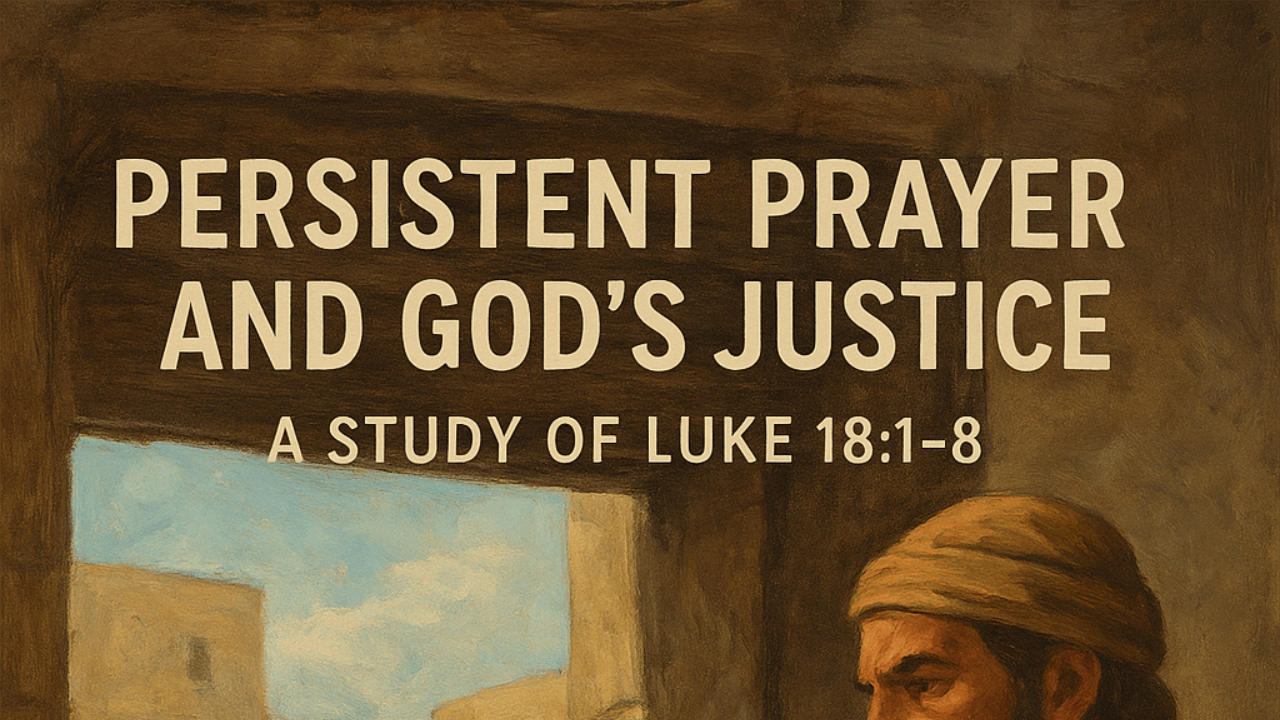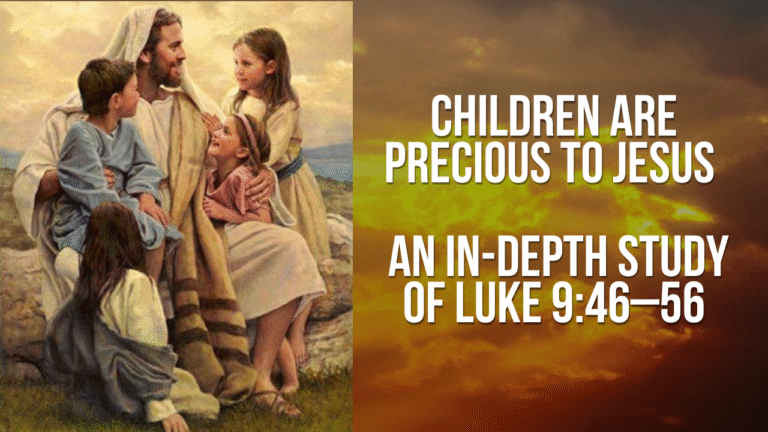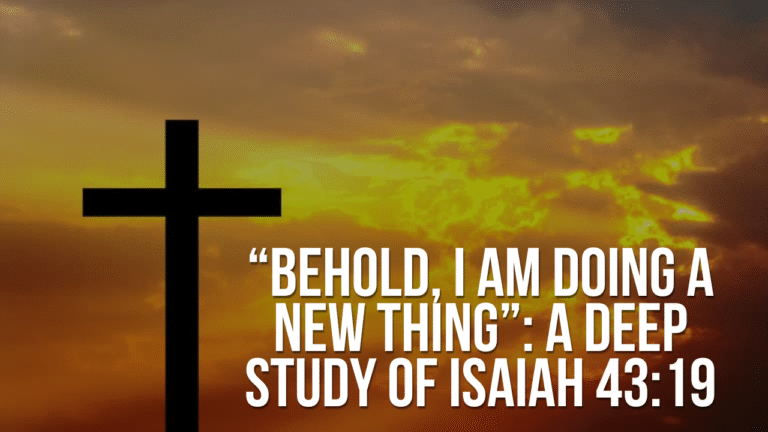Persistent Prayer and God’s Justice: A Study of Luke 18:1–8
Introduction
Luke 18:1–8 records one of Jesus’ most striking parables—the story of the persistent widow and the unjust judge. This passage highlights the importance of persevering in prayer, trusting God’s timing, and holding onto faith until the end. Jesus uses a simple yet profound story to teach His disciples how they should approach God with unshakable persistence and faith, even when answers seem delayed.
This article explores the meaning of Luke 18:1–8 in detail, providing historical context, theological insight, practical applications, and examples to show how this passage continues to guide believers today.
Scripture Text (Luke 18:1–8, NLT)
One day Jesus told his disciples a story to show that they should always pray and never give up. “There was a judge in a certain city,” he said, “who neither feared God nor cared about people. A widow of that city came to him repeatedly, saying, ‘Give me justice in this dispute with my enemy.’ The judge ignored her for a while, but finally he said to himself, ‘I don’t fear God or care about people, but this woman is driving me crazy. I’m going to see that she gets justice, because she is wearing me out with her constant requests!’” Then the Lord said, “Learn a lesson from this unjust judge. Even he rendered a just decision in the end. So don’t you think God will surely give justice to his chosen people who cry out to him day and night? Will he keep putting them off? I tell you, he will grant justice to them quickly! But when the Son of Man returns, how many will he find on the earth who have faith?”
Context of the Passage
To understand Luke 18:1–8, it’s important to place it within the broader context of Luke’s Gospel:
-
Jesus teaching about the Kingdom of God – In the preceding chapter (Luke 17:20–37), Jesus speaks about His second coming and the need for readiness. The parable in Luke 18 flows naturally as a reminder that waiting for God’s kingdom requires persistent prayer.
-
The audience – Jesus directs this teaching primarily to His disciples, but its application extends to all believers who experience trials, injustice, or delays in answered prayers.
-
The literary purpose – Luke introduces the parable with a rare direct statement of its meaning: “to show that they should always pray and never give up” (v.1). This sets the tone for the entire passage.
The Parable Explained
The Characters
-
The Widow – In biblical times, widows were among the most vulnerable members of society, often powerless, poor, and without legal standing. Her persistence symbolizes the desperate, dependent faith of believers who cry out to God.
-
The Judge – Described as unjust, corrupt, and indifferent to both God and people. He represents the opposite of God’s character, making the contrast even sharper.
The Widow’s Persistence
The widow’s continual petitions—day after day, unrelenting—demonstrate determination. Though powerless, she refuses to quit, showing what it means to pray without ceasing.
The Judge’s Reluctant Response
The judge admits his lack of morality but grants justice simply because the widow will not stop. He acts out of annoyance, not compassion.
The Contrast with God
Jesus’ central point is not that God resembles the unjust judge, but that He is infinitely better. If persistence can sway a corrupt man, how much more will a loving and righteous God respond to His chosen ones?
Key Lessons from the Parable
1. Always Pray and Never Give Up
Jesus teaches that prayer is not occasional but continual. Believers are to persist even when heaven seems silent. Prayer is not about convincing God but aligning our hearts with His will.
2. God’s Character Is Just and Compassionate
Unlike the corrupt judge, God is righteous and attentive. He cares deeply about His people and their cries for justice.
3. Justice Will Come—But in God’s Timing
Jesus assures that God will act swiftly when the time is right. “Swiftly” here doesn’t always mean immediately; it means decisively and without delay when God determines the moment.
4. Faith Will Be Tested
Jesus ends with a piercing question: “When the Son of Man comes, will he find faith on the earth?” Persistence in prayer is evidence of faith. The true test of faith is whether we continue to trust God even when answers seem far away.
Applications for Believers Today
1. Perseverance in Prayer
Modern believers often give up when prayers aren’t answered quickly. This parable challenges us to keep praying for lost loved ones, for healing, for revival, or for justice, even when the waiting feels long.
2. Confidence in God’s Goodness
We can rest in knowing God is nothing like the unjust judge. His delays are never out of neglect but out of love and wisdom.
3. Strength for the Weary
The widow reminds us that even the seemingly powerless can prevail through persistence. God listens to the cries of the weak, the oppressed, and the marginalized.
4. Endurance in Trials
Life’s hardships test faith. Jesus calls His followers to hold on, trusting that justice and restoration will ultimately come when He returns.
Practical Examples
-
A Parent’s Prayer for a Prodigal Child – Many parents spend years praying for their children to return to God. Like the widow, they must not give up, believing God hears every cry.
-
The Church in Persecuted Nations – Believers under persecution pray for justice and deliverance. This passage reassures them that God will act in His time.
-
Personal Struggles – Whether praying for healing, provision, or breakthrough, the believer is encouraged not to lose heart, trusting God’s perfect timing.
Theological Insights
The Nature of Prayer
Prayer is not mechanical repetition but relational persistence. It shapes the heart of the believer while demonstrating faith.
God’s Justice
God’s justice may not always be immediate in this world, but His kingdom guarantees ultimate vindication for the righteous.
Faith and Eschatology
Jesus ties persistent prayer to His return, reminding us that prayer is a way of keeping faith alive until the end.
Challenges for Believers
-
Impatience – Our culture seeks instant results, but God’s timing refines faith.
-
Discouragement – Long delays can cause doubt, yet this parable encourages endurance.
-
Spiritual Laziness – Prayer requires discipline and intentionality, not occasional attempts.
Encouragement from Other Scriptures
-
1 Thessalonians 5:17 – “Pray without ceasing.”
-
James 5:16 – “The earnest prayer of a righteous person has great power and produces wonderful results.”
-
Isaiah 40:31 – “But those who trust in the Lord will find new strength.”
Conclusion
Luke 18:1–8 is more than just a story about persistence—it is a call to faith. Jesus reassures us that God is not indifferent like the unjust judge. He hears, He cares, and He will act in justice and love. But He also challenges us: Will we continue to pray, believe, and trust until He comes again?
This parable calls every believer to a life of enduring prayer, rooted in faith, and confident in the God who hears. In times of silence, we persist. In times of delay, we trust. And in the end, justice will come swiftly, for God is faithful.
Daily Devotional – Luke 18:1–8
Jesus told the parable of the persistent widow to remind us to always pray and never give up. The widow had no power of her own, yet her persistence moved even an unjust judge to act. If persistence can sway a corrupt man, how much more will our loving and just God respond to His children? Sometimes God’s timing feels delayed, but His justice is sure, and His answers come at the right moment. Prayer is not about wearing God down but about building our faith and dependence on Him. When Christ returns, will He find us still praying and trusting? Let us remain steadfast, knowing our prayers are heard and our faith is precious to Him.
🙏 Prayer:
Lord, help me to pray with persistence and not lose heart. Teach me to trust Your timing and justice, even when answers seem delayed. Strengthen my faith so that when You return, You will find me waiting in hope and prayer. Amen.







